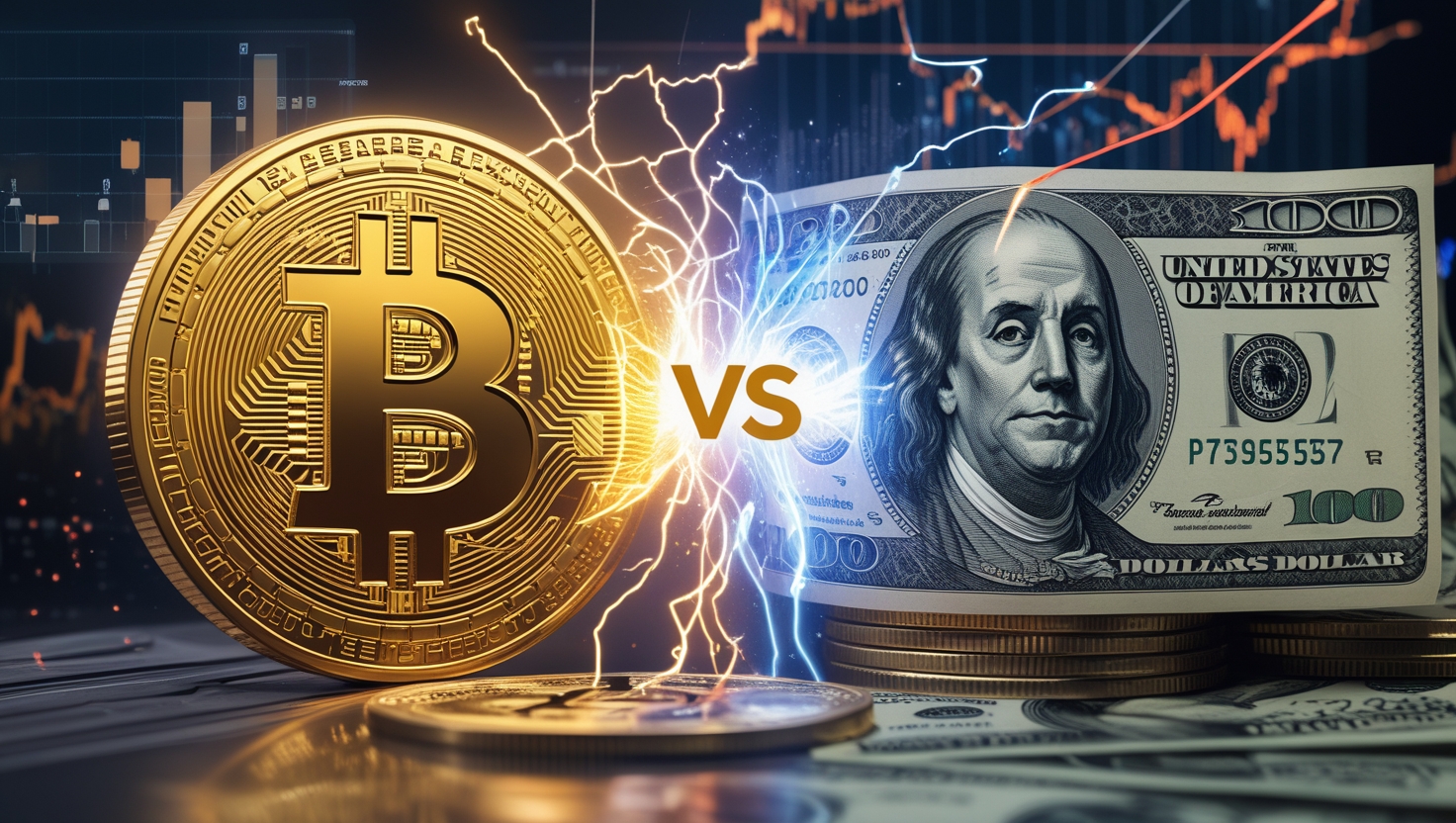Crypto the Future of Money?
As the world rapidly transitions toward digital solutions in almost every aspect of life, questions about the future of currency are becoming increasingly relevant. One of the most intriguing questions that arise is whether Bitcoin, a decentralized digital asset, could replace the US Dollar as the world’s reserve currency. This topic has sparked discussions across financial markets, technology forums, and government institutions. In this article, we will explore the dynamics of Bitcoin vs Dollar, examine the potential of Bitcoin adoption on a global scale, and analyze the future of the cryptocurrency market.
What Is Bitcoin, and Why Does It Matter?
Bitcoin, often regarded as the first successful cryptocurrency, was created in 2009 by an anonymous individual or group known as Satoshi Nakamoto. It operates on a decentralized network called blockchain, which allows for peer-to-peer transactions without the need for intermediaries like banks. Unlike traditional fiat currencies, Bitcoin isn’t controlled by any government or central bank, which makes it appealing to individuals seeking financial freedom from governmental oversight.
The appeal of Bitcoin is clear: it offers a level of transparency, security, and decentralization that fiat currencies like the Dollar cannot replicate. However, many wonder if Bitcoin has the potential to replace the Dollar or if it will remain a niche asset for tech enthusiasts and investors. Let’s break down the pros and cons of Bitcoin compared to the Dollar and see what the future may hold.
The Global Financial System and the Dollar’s Dominance
The US Dollar (USD) has served as the world’s reserve currency since the Bretton Woods Agreement in 1944. This means that most international trade is conducted using Dollars, and central banks around the world hold significant reserves in USD. The dominance of the Dollar has been a cornerstone of the global financial system, providing stability and predictability in international trade.
But with the rise of digital currencies like Bitcoin, many are beginning to question the longevity of this status. Bitcoin offers the possibility of a decentralized financial system that isn’t dependent on central banks or governments. This is appealing, especially in countries with unstable currencies or economies.
Can Bitcoin Replace the Dollar?
While it may sound far-fetched, there are several factors that suggest Bitcoin could potentially replace the Dollar as the dominant global currency in the future. Let’s explore these factors:
1. Bitcoin Adoption and Mass Acceptance
One of the key hurdles for Bitcoin to replace the Dollar is widespread adoption. Currently, Bitcoin is still viewed as a speculative investment rather than a mainstream currency. However, in recent years, more companies and even governments have begun accepting Bitcoin as a form of payment. El Salvador, for example, became the first country to adopt Bitcoin as legal tender in 2021.
As more people embrace Bitcoin for its benefits, such as low transaction fees and decentralized nature, its potential to rival the Dollar grows. Additionally, the rise of decentralized finance (DeFi) platforms is making Bitcoin more accessible and usable for everyday transactions.
2. Bitcoin’s Limited Supply
Unlike the Dollar, which can be printed at will by the Federal Reserve, Bitcoin has a fixed supply of 21 million coins. This scarcity has made Bitcoin an attractive asset for investors seeking a store of value. As inflation continues to erode the value of traditional currencies, Bitcoin’s deflationary nature could lead more people to turn to it as a hedge against inflation and currency devaluation.
3. Security and Transparency
One of the core selling points of Bitcoin is its security. Transactions are recorded on a public ledger known as the blockchain, which is nearly impossible to tamper with. This level of transparency is unmatched by traditional currencies, which are subject to manipulation by central banks and governments.
As people grow more distrustful of traditional financial institutions, Bitcoin’s transparent and secure nature could make it a more attractive option for international trade and investment.
The Challenges Facing Bitcoin as the World’s Reserve Currency
While the potential for Bitcoin to replace the Dollar is exciting, there are several challenges that must be addressed before it can become the dominant global currency:
1. Volatility
Bitcoin is notoriously volatile, with its price fluctuating wildly over short periods. This volatility makes it difficult to use as a stable store of value, which is one of the key functions of a reserve currency. For Bitcoin to replace the Dollar, its volatility would need to decrease significantly, making it more reliable for everyday transactions.
2. Regulation and Legal Hurdles
Governments and regulatory bodies are still figuring out how to deal with Bitcoin and other cryptocurrencies. In many countries, cryptocurrencies are heavily regulated or outright banned. If Bitcoin is to become a global currency, governments will need to create clear frameworks that allow for its use while also addressing concerns such as money laundering, fraud, and tax evasion.
3. Energy Consumption
Another challenge for Bitcoin is its energy consumption. Bitcoin mining requires significant computational power, which translates into a high carbon footprint. This has raised concerns about its sustainability in the long term, especially as governments and organizations push for greener energy practices. If Bitcoin is to replace the Dollar, solutions to reduce its environmental impact will need to be found.
The Future of Digital Currencies and the Dollar
While it’s difficult to predict exactly what the future holds, it’s clear that the rise of digital currencies like Bitcoin is challenging traditional notions of money. Cryptocurrencies have the potential to transform the global financial system, providing a decentralized alternative to the centralized control of fiat currencies like the Dollar.
As more businesses, individuals, and governments experiment with Bitcoin and other cryptocurrencies, we may see an increasing shift away from the traditional financial system. Whether Bitcoin will ultimately replace the Dollar remains to be seen, but the rise of digital currencies is undeniable. The future of currency is digital, and Bitcoin may very well play a central role in this transformation.
Additional Resources
Internal Links
By exploring the dynamics of Bitcoin vs Dollar and its potential future, it becomes evident that while Bitcoin offers unique advantages, challenges like volatility, regulation, and adoption need to be overcome. The digital currency revolution is underway, and it could reshape the future of finance in ways we have yet to fully comprehend. Keep an eye on this space, as the world of finance may soon look very different than it does today.
Focus Keyword: Bitcoin vs Dollar
Related Keywords: Bitcoin adoption, Cryptocurrency market, Digital currency future, Global financial system.










